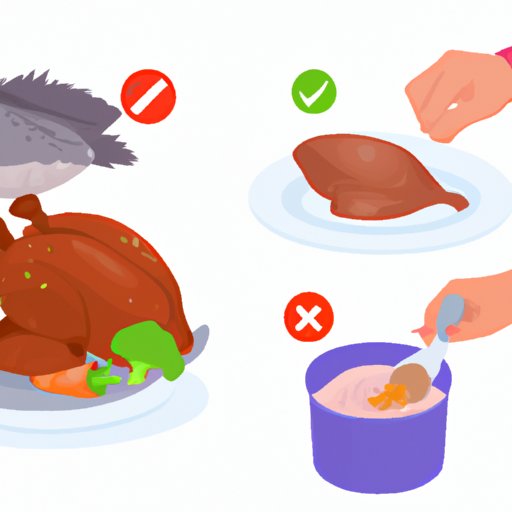
Introduction
Chicken is a staple in many households, and it’s essential to ensure it’s prepared safely to avoid foodborne illness. In this article, we’ll explore the risks of eating undercooked chicken and how to prevent and deal with food poisoning.
The Risks of Undercooked Chicken: Why You Should Always Cook Your Poultry Thoroughly
Undercooked chicken contains harmful bacteria such as Salmonella and Campylobacter. These bacteria can cause severe food poisoning, leading to symptoms such as abdominal pain, diarrhea, and fever. Cooking chicken to an internal temperature of 165°F is crucial to kill these pathogens and prevent foodborne illness.
Salmonella and Other Dangers of Eating Undercooked Chicken
Salmonella is a common type of bacteria found in undercooked chicken. Symptoms of a Salmonella infection generally appear a few hours or up to two days after consumption and can last for up to a week in many cases. Other dangers from consuming undercooked chicken include Campylobacter, E. coli, and Clostridium perfringens, among others. These bacteria can cause severe symptoms, including vomiting, dehydration, cramping, and fever.
The Symptoms and Lasting Effects of Consuming Undercooked Chicken
Consuming undercooked chicken can cause a range of symptoms, including nausea, abdominal cramps, vomiting, and fever. In most cases, people recover within a few days. However, severe food poisoning due to undercooked chicken can lead to more critical complications, such as reactive arthritis, kidney failure, and even death.
The Importance of Proper Handling and Cooking of Chicken to Avoid Food Poisoning
Proper handling and cooking of chicken is crucial to avoid food poisoning. Here are some practical tips:
- Wash your hands before and after handling raw chicken.
- Use separate cutting boards and utensils for raw chicken to avoid cross-contamination.
- Thaw frozen chicken in the refrigerator, not on the counter.
- Cook chicken to an internal temperature of 165°F to kill all bacteria.
- Avoid washing raw chicken before cooking, as it can spread bacteria.
- Refrigerate leftover chicken within two hours after cooking.
How to Identify Undercooked Chicken and What to Do If You Have Consumed It
To tell if chicken is undercooked, look for pink meat or clear juices. Fully cooked chicken should have no pink areas, and the juices should run clear. If you suspect you have consumed undercooked chicken or have symptoms of food poisoning, seek medical attention immediately. Report any food poisoning outbreaks to your local health department.
Conclusion
The risks of consuming undercooked chicken are high and can lead to severe health complications. Proper handling and cooking of chicken are essential to avoid food poisoning. Always cook chicken to an internal temperature of 165°F and follow safe preparation practices to prevent foodborne illness. Share this information with friends and family to help keep everyone safe from food poisoning.





